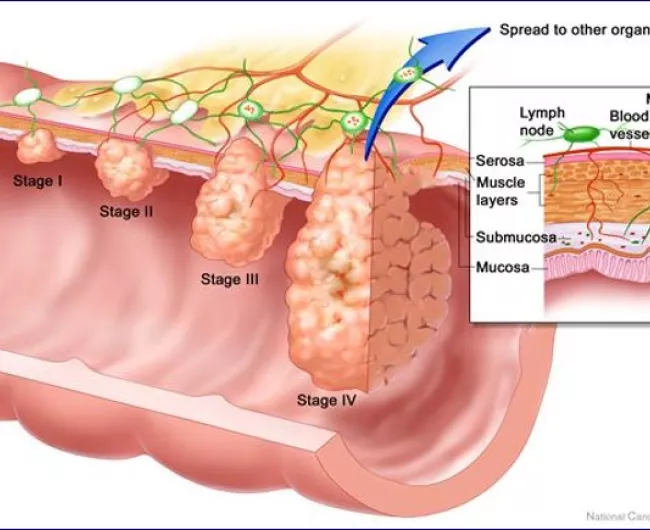Sexual health and colorectal cancer
Men and women may experience sexual side effects from colorectal cancer treatment. Steps can be taken to help ensure continued intimacy and sexual health.

Women's sexual health issues
Women treated for colorectal cancer are at risk of side effects that impact sexual function and intimacy. Common side effects include:
- Vaginal stenosis
- Vaginal atrophy
- Vaginal irritation
How to manage vaginal stenosis, atrophy, and irritation
Vaginal stenosis, atrophy, and irritation can occur as side effects of surgery, radiation therapy, hormone therapy, chemotherapy, and other medications. Be sure to talk with a doctor before colorectal cancer treatment about what to expect and how to manage side effects. Common treatments for vaginal stenosis, atrophy, and irritation include:
Vaginal dilation therapy
Gently stretch the vaginal walls by regularly using a device called a vaginal dilator. Speak with your healthcare provider before treatment begins.
Increase moisture
Vaginal stenosis often results in increased dryness in the vagina, so using a dedicated vaginal moisturizer could help to increase hydration. In addition to vaginal moisturizer, topical estrogen can be helpful. Talk to your doctor about what would work best for you.
Relieve pain
If you’ve experienced any pain during attempted penetration, using a heat pack can reduce discomfort. A feminine cooling pad can be used hot or cold and tucked in your underwear for direct contact.
Pelvic floor therapy
Pelvic floor muscles may be affected permanently after surgery and/or radiation. Pelvic floor therapy reconditions pelvic floor muscles and can reduce pain.

Men's sexual health issues
Men treated for colorectal cancer are at risk of erectile dysfunction and related side effects.
What men need to know about sexual function and colorectal cancer
Men who undergo surgery or radiation for colorectal cancer may develop erectile dysfunction (ED) as a result. Surgery to remove tumors from the colon or rectum often damage nerves. Radiation may damage nerves in your pelvic area, block blood flow to your penis, or decrease the level of testosterone in your body.
Men who smoke or who have a history of heart disease, high blood pressure, or diabetes also may be at a higher risk of ED after radiation therapy. These conditions may have already caused some artery damage, which can be made worse by radiation. Radiation's side effects start slowly. They typically emerge about six months to a year after treatment.
The amount of semen you ejaculate may decrease after radiation therapy. After treatment, you may feel pain during ejaculation after treatment, though the pain usually goes away over time.
Nerves damaged during surgery may cause you to experience a dry orgasm. During a dry orgasm, semen may not leave your testicles or they may be pushed into your bladder (retrograde ejaculation).
How to prevent ED
Your doctor can provide more information about sexual dysfunction. Discuss treatment options, including medications, implants, or devices that can facilitate an erection.
Radiation specialists have developed techniques that target just the rectum and avoid surrounding tissue, nerves, and blood vessels essential to erectile function. Men diagnosed with young-onset colorectal cancer surgery may be candidates for nerve-sparing surgery. This technique causes little or no damage to those critical nerves needed to achieve an erection.
Having open communication with your partner can also help. Let your partner know what works best for you. Be honest about your concerns and feelings. If you're silent about what you're experiencing, your partner may feel rejected. Your partner can offer vital support as you recover from cancer treatment.

Specialists can help you
If you're experiencing sexual dysfunction, the medical community offers numerous specialists who can help improve your sexual health.
A psychologist
A psychologist with a specialization in sexual rehabilitation counseling can provide essential support and guidance to men, women, and couples dealing with sexual dysfunction during and following colorectal cancer treatment. They can help address emotional and psychological challenges, provide strategies to improve communication, and offer techniques to rebuild intimacy and sexual confidence.
A gynecologist (women)
A gynecologist with a focus on female sexual health can offer expert medical advice and treatments for physical challenges related to sexual dysfunction. They can assess the impact of colorectal cancer treatment on sexual organs and function, recommend appropriate interventions, and provide ongoing care to optimize sexual health.
A urologist (men)
A urologist with expertise in male sexual health is a specialist in the anatomy and physiology of the male reproductive system and can provide comprehensive information about the causes of sexual dysfunction. They can recommend targeted treatments and interventions that address the specific issues contributing to sexual dysfunction, helping men regain sexual function, confidence, and overall well-being.
An endocrinologist
Hormonal changes can significantly affect sexual function. An endocrinologist who focuses on hormonal changes can assess and monitor hormonal levels, recommend appropriate hormonal therapies, and manage any side effects to help improve sexual function and overall well-being.
A mental health provider
A mental health professional with expertise in cancer or sexual and relationship issues can offer crucial support in coping with the physical and emotional challenges that cancer brings, and help determine how to move forward in relationships. Whether you have a partner or are looking for one, a therapist with expertise in cancer and/or sexual and relationship issues can provide tailored strategies to manage stress, anxiety, and relationship challenges.
A physical medicine and rehabilitation specialist
Consulting a physical medicine and rehabilitation specialist can promote healing, reduce pain, and improve quality of life. They can provide personalized exercise and rehabilitation programs to enhance physical strength, mobility, and function, which are essential for a healthy sexual life.

Video: Sexual function, fertility, and CRC
Alliance staff members and volunteer allies hold an important discussion about what can be done to help preserve your sexual health during and after colorectal cancer.
Call the Helpline
Our Helpline is free and available to support you. Connect with certified patient and family support navigators who are ready to listen and assist you.
Top resources

Gabriel Leblanc: How the Alliance changed my life
It’s scary to hear the “c” word, especially when you’re only 36. A million questions ran through Gabriel Leblanc’s mind, but only one seemed to matter. “How was I going to get through this?” Gabriel said.

What are the best types of colonoscopy prep?
Several different types of colonoscopy prep regimens are available today, including prescription and over-the-counter options. While it is important to consult your healthcare provider for guidance, it can be helpful to conduct some of your own research.

Marijuana and colorectal cancer: Does weed help?
Up to 40% of cancer patients report marijuana usage to relieve or improve their symptoms. But what does the research say about weed and cancer?





